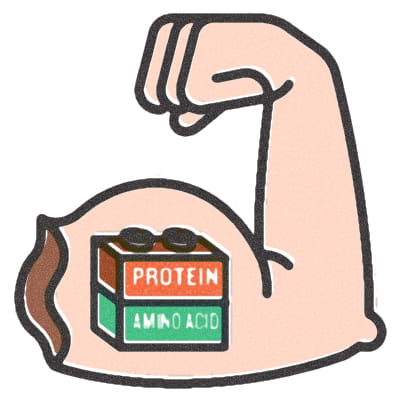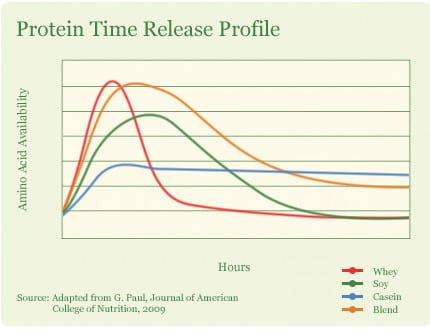MacEwan University Sport and Wellness presents the first of an ongoing nutrition in sport series to disseminate a review of the scientific literature on various topics. If it is in your shaker cup and you want to know about it, let us know through our social media outlets.
If you ask any gym rat or fitness enthusiast they  would all agree that protein is the one macronutrient responsible for big muscle gains. Protein is one of three (lipids or fat and carbohydrate) macronutrients essential to life. Protein composes the makeup of boney structure, connective tissue and regulates processes essential to daily function. Protein structure is composed of amino acids; there are 20 total, nine are essential and three of those are branched chain amino acids (BCAA). The nine essential amino acids must be ingested; the remaining amino acids can be synthesized from the breakdown of muscle protein. Complete sources, containing all essential AA’s, include dairy, eggs, red meat, fish, poultry and soy. Incomplete protein sources include legumes, vegetables, cereals and grain products. Incomplete sources must be paired together (corn/beans) to provide a complete AA profile. Based on protein quality, eggs are considered the gold standard and two of the most commonly ingested ergogenic aids, whey and casein come in a close second and third respectively (Hoffman, 2004).
would all agree that protein is the one macronutrient responsible for big muscle gains. Protein is one of three (lipids or fat and carbohydrate) macronutrients essential to life. Protein composes the makeup of boney structure, connective tissue and regulates processes essential to daily function. Protein structure is composed of amino acids; there are 20 total, nine are essential and three of those are branched chain amino acids (BCAA). The nine essential amino acids must be ingested; the remaining amino acids can be synthesized from the breakdown of muscle protein. Complete sources, containing all essential AA’s, include dairy, eggs, red meat, fish, poultry and soy. Incomplete protein sources include legumes, vegetables, cereals and grain products. Incomplete sources must be paired together (corn/beans) to provide a complete AA profile. Based on protein quality, eggs are considered the gold standard and two of the most commonly ingested ergogenic aids, whey and casein come in a close second and third respectively (Hoffman, 2004).
How Much Protein Should I Have?
The recommended dietary intake of protein for healthy adults is approximately 0.84 g/kg of body weight or an acceptable macronutrient distribution range of 10%-35% of energy intake.
| CANADIAN | AVG WEIGHT | PROTEIN INTAKE | ENERGY REQUIREMENTS | PROTEIN INTAKE |
| MALES | 82.7 kg/181 lbs. | 69.5 g | ~3000 calories | 75 g – 262.5 g |
| FEMALES | 69.4 kg/151 lbs. | 58 g | ~2333 calories | 58 g – 204 g |
The numbers used for energy requirements were based on the average recommended intake of active3 male and females between the ages of 18 to 50 years old (http://www.hc-sc.gc.ca/fn-an/food-guide-aliment/basics-base/1_1_1-eng.php). A variety of factors including age, gender, body type, activity level and type of activity dictate the amount of protein one should ingest to suit their requirements. There is no clear consensus amount of protein one should ingest. Intake varies if you are sedentary, a body builder, endurance or power athletes. There is no set UL as research varies, but more is not necessarily better.
Can I Have Too Much Protein?
The body can only ingest so much at a single serving and throughout the day. At some point the excess protein will be oxidized (broken down) and used for energy, other processes or excreted. High protein intake has been associated with kidney problems; however, there is no conclusive evidence that high level of protein intake affects kidney function in healthy individuals (Martin, 2005). Higher protein diets have been shown to improve body composition (https://www.biolayne.com/articles/nutrition/protein-just-muscle-building-substrate/)
When Should I Have Protein?
Nutrient timing may be just as important as the amount of protein ingested. Timing windows, pre and post workout and before bed, are all things to consider when being physically active and providing the body with the right mix of nutrients to perform and more importantly recover.
 The graph to the right illustrates the unique properties of supplemented protein sources. Whey protein is considered a ‘fast’ digesting protein, there is an initial spike of amino acids and it drops off much faster than the others. Casein, another commonly supplemented dairy protein, by nature demonstrates a slower release profile because of its ability to clot in the stomach. Determining which protein is better is a whole university course on ergogenic aids. There’s enough research on protein you could put it all at the ends of a barbell and get a good sweat on lifting it.
The graph to the right illustrates the unique properties of supplemented protein sources. Whey protein is considered a ‘fast’ digesting protein, there is an initial spike of amino acids and it drops off much faster than the others. Casein, another commonly supplemented dairy protein, by nature demonstrates a slower release profile because of its ability to clot in the stomach. Determining which protein is better is a whole university course on ergogenic aids. There’s enough research on protein you could put it all at the ends of a barbell and get a good sweat on lifting it.
Whether you are an avid gym goer, athlete or stay at home parent, getting the right amount of quality protein from various sources will go a long way in maintaining a healthy lifestyle. If you would like to know more about protein types, which is the best, or any other ergogenic aid as it pertains to performance please let us know!
References
Hoffman, J. a. (2004). Protein Which is Best? J Sports Sci Med., 118-130.
Martin, L. L. (2005). Dietary protein intake and renal functino. Nutr Metab.



